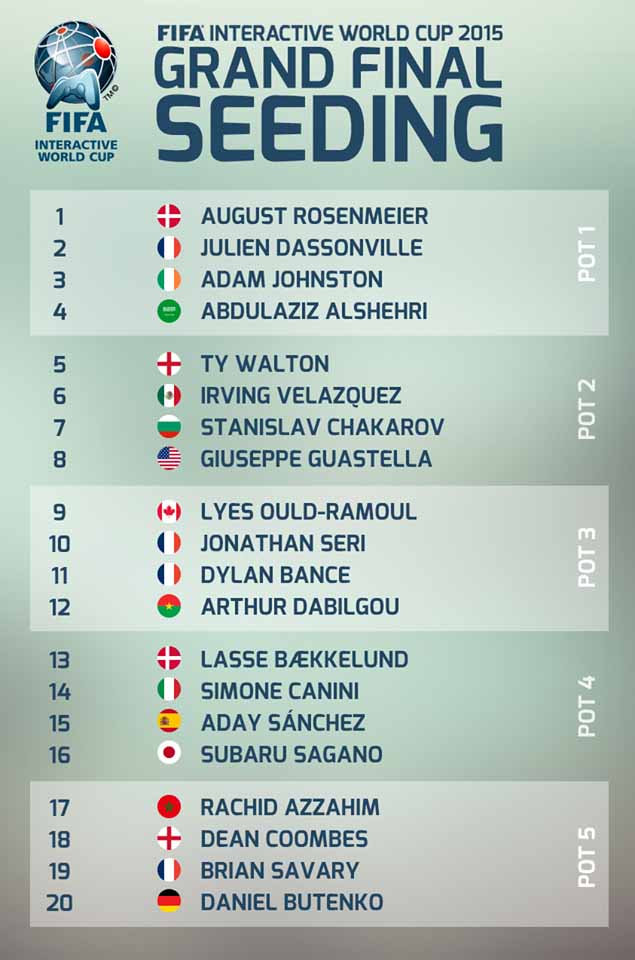The 20 Finalists for FIWC 2015 Grand Final have been seeded according to their World Ranking and divided into five pots. Check their world ranking and seeding.
Info
FIFA Game News is an official media partner
of the FIFA Interactive World Cup 2016.
We will publish everything about this competition
and we will broadcasting the most important matches.
Stay tuned to our website.
FIWC 2015 Grand Final Seeding
The 20 Grand Finalists for the FIFA Interactive World Cup 2015 are eagerly awaiting their trip to Munich for the main event. Join them from 18 to 19 May as they compete in the Grand Final of the world’s largest gaming tournament. We will be streaming the Grand Final match days live on our website.
The 20 Grand Finalists for FIWC 2015 have been seeded according to their World Ranking and divided into five pots. On 17 May, the Tournament Draw will be conducted in Munich to decide the Groups for the 2015 Grand Final. At the draw, all players from Pot 1 will be drawn one at a time and placed into the groups in alphabetical order (i.e. Group A, then Group B, etc.). Next, all players from Pot 2 will be drawn and placed into the groups in alphabetical order. This process will be repeated for all remaining pots until all players are drawn.
Pot 1: August Rosenmeier, Julien Dassonville, Adam Johnston, Abdulaziz Alshehri
Pot 2: Ty Walton, Irving Velazquez Leyva, Stanislav Chakarov, Giuseppe Guastella
Pot 3: Lyes Ould-Ramoul, Jonathan Seri, Dylan Bance, Arthur Toussida Dabilgou
Pot 4: Lasse Hovgaard Bækkelund, Simone Canini, Aday Ortega Sanchez, Subaru Sagano
Pot 5: Rachid Azzahim, Dean Coombes, Brian Savary, Daniel Butenko
Players were seeded based on FIFA Interactive World Cup World Ranking, which takes into account matches played during qualification for the current tournament as well as matches played at the past four Grand Finals.
| World Ranking (WR) | Seeding | Name | Country | WR Points |
| 1 | 1 | August Rosenmeier | Denmark | 30.85 |
| 2 | 2 | Julien Dassonville | France | 18.95 |
| 3 | 3 | Adam Johnston | Ireland Republic | 17.92 |
| 4 | 4 | Abdulaziz Alshehri | Saudi Arabia | 17.9 |
| 6 | 5 | Ty Walton | England | 15.85 |
| 7 | 6 | Irving V. Leyva | Mexico | 14.4 |
| 8 | 7 | Stanislav Chakarov | Bulgaria | 14.2 |
| 9 | 8 | Giuseppe Guastella | USA | 13.4 |
| 11 | 9 | Lyes Ould-Ramoul | Canada | 10.95 |
| 12 | 10 | Jonathan Seri | France | 10.85 |
| 13 | 11 | Dylan Bance | France | 10 |
| 13 | 12 | Arthur T. Dabilgou | Burkina Faso | 10 |
| 15 | 13 | Lasse H. Bækkelund | Denmark | 9.93 |
| 16 | 14 | Simone Canini | Italy | 9.91 |
| 17 | 15 | Aday O. Sanchez | Spain | 9.74 |
| 18 | 16 | Subaru Sagano | Japan | 8.95 |
| 19 | 17 | Rachid Azzahim | Morocco | 8.93 |
| 30 | 18 | Dean Coombes | England | 4 |
| 30 | 19 | Brian Savary | France | 4 |
| 30 | 20 | Daniel Butenko | Germany | 4 |

The World Ranking Explained
All players that compete in the FIFA Interactive World Cup 2015 are seeded based on the FIFA Interactive World Cup World Ranking. The ranking takes into account both matches played during the qualification phase for the current tournament and matches played at previous FIWC Grand Finals. Below is a full breakdown of the World Ranking calculation.
Grand Final Performance Points
Every match played at a Grand Final carries a points value for the World Ranking. A win is worth 3 points and a draw is worth 1 point. Group Matches are counted normally, quarter-finals are worth double, semi-finals are multiplied by three (e.g. a semi-final win is worth 3×3 = 9 points) and the Final is worth four times as much (e.g. a victory in the Final is worth 3×4=12 points). The match for third place carries no points value for the World Ranking calculation.
The most recent four years of FIWC competition are included in the World Ranking calculation based on a scale of decreasing value. This ensures that the most recent performances hold a stronger value than older ones. For the FIWC 2015 World Ranking the calculation is:
FIWC 2015 points x 1
FIWC 2014 points x 0.5
FIWC 2013 points x 0.3
FIWC 2012 points x 0.2
Player Movement points
A player can gain or lose Player Movement points based on their Grand Final performances from year to year. For example, if a player that finished in fifth place at FIWC 2013 returned to the Grand Final in FIWC 2014 and finished in 17th place, their Player Movement points would be 5 -17= -12. The player would therefore be deducted 12 points from their World Ranking score for FIWC 2015. If a player did not attend a specific Grand Final, their ranking for that Grand Final is automatically set at 20th place.
Player Movement points for FIWC 2015 are calculated by: FIWC 2013 ranking – FIWC 2014 ranking = Player Movement points for FIWC 2015. For example, reigning champion August Rosenmeier’s Player Movement points for FIWC 2015 are: Rank for FIWC 2013 (5th) – Rank for FIWC 2014 (1st) = 4 points.
Player Movement scenarios
a) Player competed at FIWC 2014 (finished in 10th place) but not at FIWC13: The player’s ranking for FIWC 2013 would automatically be 20. Therefore, their Player Movement points for the FIWC 2015 World Ranking would be 20 -10 = 10 points.
b) Player competed at FIWC 2013 (finished in 8th place) but not at FIWC14: The player’s ranking for FIWC 2014 would automatically be 20. Their Player Movement points for the FIWC 2015 World Ranking would be 8 – 20 = -12 points.
Points from Qualification
Each player receives qualification points which count towards their World Ranking score based on the manner in which they qualified for FIWC 2015.
Reigning champion: 0
Online season winner: 8 points
Online season runner-up: 7 points
Online season third-place qualifier: 6 points
Live qualification event winner: 4 points
Online Matches points
For each online season of FIWC 2015 a ratio is calculated for every player based on a points system. (3 points for a win and 1 point for a draw). All points are added together and are divided by the number of online matches played in a season. (This creates a ratio value between 0 and 3). This calculation is done for each of the six online seasons. If a player competed in more than one season, their points are calculated separately for each season and then an average is created from all online seasons that they competed in. Only seasons in which a player competed in 10 or more matches are taken into calculation. These Online matches points are added to a players overall World Ranking score.

